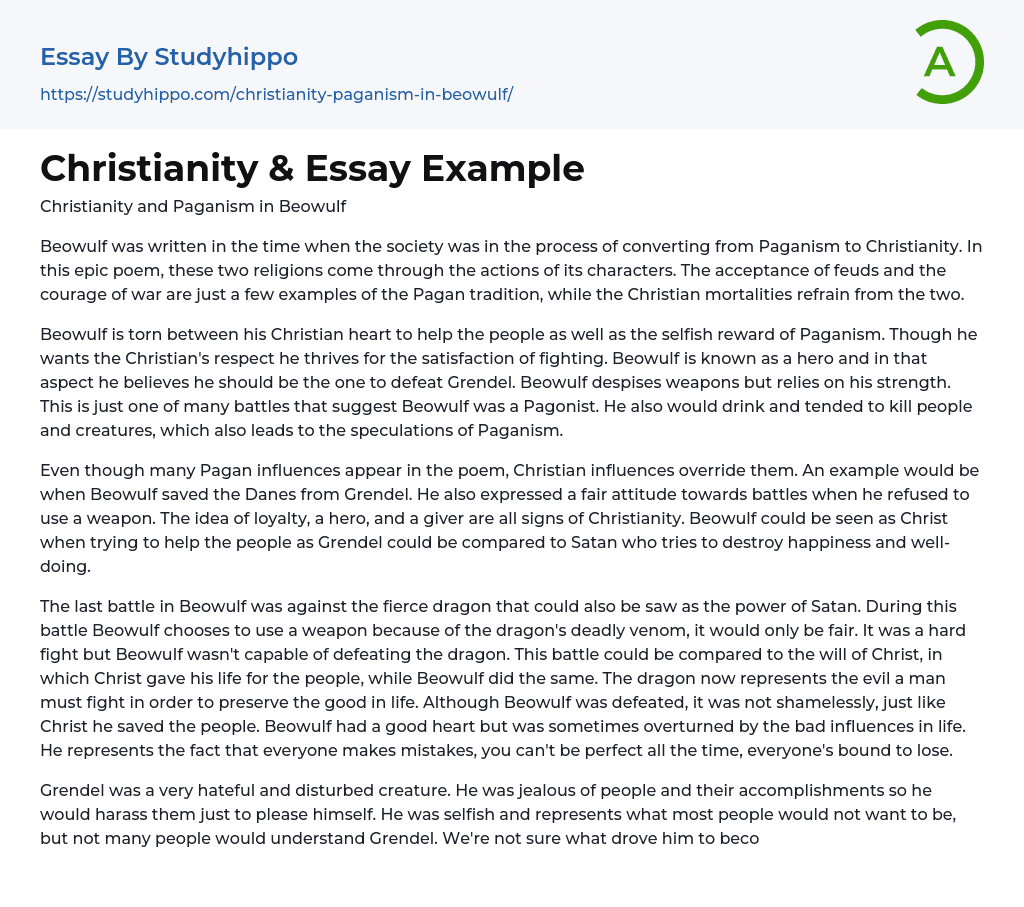Christianity and Paganism in Beowulf
Beowulf was written in the time when the society was in the process of converting from Paganism to Christianity. In this epic poem, these two religions come through the actions of its characters. The acceptance of feuds and the courage of war are just a few examples of the Pagan tradition, while the Christian mortalities refrain from the two.
Beowulf is torn between his Christian heart to help the people as well as the selfish reward of Paganism. Though he wants the Christian's respect he thrives for the satisfaction of fighting. Beowulf is known as a hero and in that aspect he believes he should be the one to defeat Grendel. Beowulf despises weapons but relies on his strength. This is just one of many battles that suggest Beowulf was a Pagonist.
...He also would drink and tended to kill people and creatures, which also leads to the speculations of Paganism.
Even though many Pagan influences appear in the poem, Christian influences override them. An example would be when Beowulf saved the Danes from Grendel. He also expressed a fair attitude towards battles when he refused to use a weapon. The idea of loyalty, a hero, and a giver are all signs of Christianity. Beowulf could be seen as Christ when trying to help the people as Grendel could be compared to Satan who tries to destroy happiness and well-doing.
The last battle in Beowulf was against the fierce dragon that could also be saw as the power of Satan. During this battle Beowulf chooses to use a weapon because of the dragon's deadly venom, it would only be fair. It wa
a hard fight but Beowulf wasn't capable of defeating the dragon. This battle could be compared to the will of Christ, in which Christ gave his life for the people, while Beowulf did the same. The dragon now represents the evil a man must fight in order to preserve the good in life. Although Beowulf was defeated, it was not shamelessly, just like Christ he saved the people. Beowulf had a good heart but was sometimes overturned by the bad influences in life. He represents the fact that everyone makes mistakes, you can't be perfect all the time, everyone's bound to lose.
Grendel was a very hateful and disturbed creature. He was jealous of people and their accomplishments so he would harass them just to please himself. He was selfish and represents what most people would not want to be, but not many people would understand Grendel. We're not sure what drove him to become so evil, but I'm sure he wasn't always so cruel, or maybe he was. No one knows, but what ever it was drove him to his death. This also shows that being unkind can never help you out in the long run.
- Beowulf Epic Hero essays
- Baptism essays
- Holy Spirit essays
- Jesus Christ essays
- Adam And Eve essays
- Crucifixion Of Jesus essays
- Crusades essays
- Eucharist essays
- God The Father essays
- Pope essays
- Protestantism essays
- Christian essays
- Church essays
- Elizabeth essays
- Sacrament essays
- Catholic Church essays
- Lord essays
- Priest essays
- Protestant Reformation essays
- Aeneid essays
- Beowulf essays
- Blackberry Picking essays
- Canterbury Tales essays
- Dulce Et Decorum Est essays
- My Last Duchess essays
- Odyssey essays
- Sir Gawain And The Green Knight essays
- The Road essays
- Afterlife essays
- Atheism essays
- Bible essays
- Buddhism essays
- Christian Worldview essays
- Christianity essays
- Confession essays
- Cosmological Argument essays
- Deism essays
- Devil essays
- Existence of God essays
- Faith essays
- Freedom Of Religion essays
- God essays
- Hinduism essays
- Immortality essays
- Islam essays
- Jainism essays
- Jews essays
- Judaism essays
- Miracle essays
- Monk essays




